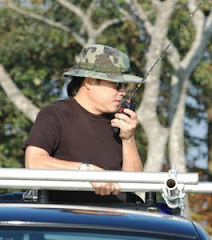 How Are We Going to Solve Communication Chaos?
How Are We Going to Solve Communication Chaos?Or 'I Am a Tag, Not a Number' Revisited
Posted by Craig Daitch on 04.24.08 @ 10:45 AM
I've noticed with alarming frequency the number of conversations between friends and colleagues that start with "I was trying to get a hold of you yesterday..."
All of these conversations stem from one symptom: Communication Chaos.
The impact of Communication Chaos can be felt ubiquitously. From our personal relationships with family and friends, to the struggles marketing professionals feel when tasked with building relationships in this new world of ours (one with an ever-shifting target).
Communication Chaos affects the TV industry as much as it affects online. Seriously -- this goes far beyond a click, an impression or a GRP. If we can't crowd source our audience into one medium, how can we continue to market to them as if we can?
Performing a personal audit of the different channels people use to access me, I came up with the following:
1 corporate e-mail account
4 personal e-mail accounts
1 office phone
2 cellphones
7 instant-messaging accounts
4 social-networking accounts
3 blogs
1 virtual world
Although I consider myself a "power user," I know for certain I'm not the worst offender of communication tools. So what's the solution?
In 2006, British author Tony Fish presented an idea at an event in London where he declared to his audience, "I am a tag, not a number."
He simplified his rationale anecdotally: He once had a landline phone that was his primary means to reaching out to friends. If he didn't know the number, he would take out his search directory and find it.
Fast forward years into his adulthood and his tools for communication have multiplied tenfold, as have those of his friends and colleagues. Furthermore, there wasn't Yellow Pages book or a search tool that indexed all the numbers and contact information of his acquaintances. What would happen if a friend changed phone numbers?
Tony questioned the relevance of numbers themselves and offers up a different solution:
"... A federated service provider will become the 'search engine by tags' -- searching my professional information. I will have added personal contacts for family so they are in by default (i.e. linked through me). The value proposition for the user appears when someone in your network modifies or updates the data with new details and that data automatically updates your data set, saving time and maintaining contact.
The bigger the network you have, the more frequently your information is refreshed and the more fresh and valuable it is."
As alarming as it is to sometimes think that a corporate entity, such as Google or Facebook, can accrue so much private data around their users (phone numbers, IM addresses, home addresses, emails, etc.), I think it'll take a non-municipal entity to get it right. This is less about how we monetize communication and more about building a platform to help us sift through the different means of communication.
An early and somewhat limited example of this concept is Grand Central, which aggregates all your phone numbers into a one and locates you, no matter which mobile or landline number you happen to be on or near at that time. Only with tags, we're talking about finding people by name (vs. a number) and encompassing all communications channels (not just by phone).
To bring the conversation into the future, the next great debate on privacy will stem from user control and presence information. How on or off the grid do you want to be if you knew that you could simplify the way someone reaches you through the consolidation of all of your online and offline points of access?
Making sense of Communication Chaos is no easy task but it's going to be a necessity. The long-tail of communication can cause more harm than good -- and I am interested to see how technology is used to solve it.


























































































































